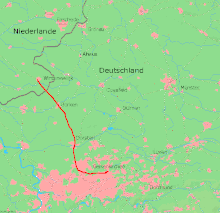Dutch-Westphalian Railway Company

The Dutch-Westphalian Railway Company was one of the railway companies operating in the Rhenish-Westphalian industrial area , but was only of regional importance, as it only had two routes, both of which were international.
Route network
The Gelsenkirchen-Bismarck-Winterswijk railway began at Gelsenkirchen-Bismarck station on the Bochum-Essen / Oberhausen railway operated by the Bergisch-Märkische Eisenbahn-Gesellschaft and ran via Gladbeck Ost, Dorsten and Borken to Winterswijk and Zutphen in the Netherlands . The Bocholt – Winterswijk railway line began in Bocholt following the Cologne-Minden Railway Company's Bocholt Railway and also ended in Winterswijk.
From Winterswijk you could reach the industrial cities in Twente , which were important at the time . In addition, there was a connection to Amsterdam and Zwolle in Zutphen .
Both routes were opened in 1880 and were used to transport hard coal to the Netherlands on the one hand and to supply the Ruhr area with agricultural products on the other. The operation was carried out from the beginning by the Bergisch-Märkische Eisenbahn-Gesellschaft, which was de facto already under state Prussian control.
history
In the German railroad policy of the 19th century, this not particularly important route played a very decisive role. With the purchase of the line, the German Chancellor Otto von Bismarck gave himself the opportunity to nationalize all of the privately owned railway companies in West Germany. The resulting financial profits flowed partly into the pockets of Bismarck, who had previously invested part of his assets in railroad shares.
In 1880, the Dutch-Westphalian Railway Company was completely taken over by the Bergisch-Märkische Railway Company and when it was nationalized in 1882 it went to the Royal Railway Direction in Elberfeld.
Todays situation
The cross-border section from Borken to Winterswijk was closed for passenger traffic after the Second World War . Freight traffic continued until 1979, when the line was officially closed in 1994.
The route from Bocholt to Winterswijk was discontinued as early as 1931 between the German border station Barlo and Winterswijk. In 1990 traffic on the remaining German section also ended.
The Dutch part of the route Burlo-Winterswijk is now designated as a nature reserve Borkener Baan .
See also
literature
- Rolf Swoboda: Railway Gelsenkirchen-Bismarck - Winterswijk (1993). ISBN 3-927587-11-7